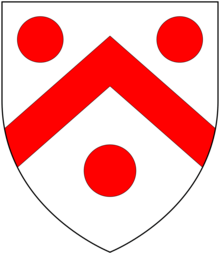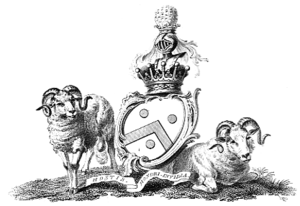Baron Sherard
Lord Sherard, Baron of Leitrim, was a title in the Peerage of Ireland. It was created in 1627 for Sir William Sherard, of Stapleford, Leicestershire. He was succeeded by his eldest son, the second Baron. He sat as Member of Parliament for Leicestershire and served as Lord Lieutenant of Rutland. His son, the third Baron, represented both Leicestershire and Rutland in Parliament and served as Lord Lieutenant of Rutland. In 1714 he was created Baron Harborough, of Harborough in the County of Leicester, with remainder to his first cousin once removed, Philip Sherard. In 1718 he was made Viscount Sherard, of Stapleford in the County of Leicester, with normal remainder to the heirs male of his body. He was even further honoured in 1719 when he was made Earl of Harborough, with similar remainder as for the barony of Harborough. All three titles were in the Peerage of Great Britain. Lord Harborough was childless and the viscountcy consequently became extinct on his death in 1732. He was succeeded in the other titles (according to the normal remainder in the barony of Sherard and according to the special remainders in the barony and earldom of Harborough) by his aforementioned first cousin once removed, Philip, the second Earl. He was the grandson of the Honourable Philip Sherard, younger son of the first Baron.


The second Earl had previously represented Rutland in Parliament and also served as Lord-Lieutenant of Rutland. Two of his sons, the third and fourth Earls, succeeded in the earldom. The latter was succeeded by his son, the fifth Earl. The barony of Harborough and earldom became extinct on the death of the fifth Earl's only son, the sixth Earl, in 1859. The late Earl was succeeded in the barony of Sherard by his distant relative (his fifth cousin) Philip Castel Sherard, who became the ninth Baron. He was the great-great-great-grandson of the Honourable George Sherard, younger son of the first Baron and younger brother of the aforementioned Philip Sherard. The ninth Baron was succeeded by his nephew, the tenth Baron. He was the elder son of Reverend Simon Haughton Sherard. He was a Commander in the Royal Navy. He died childless and was succeeded by his younger brother, the eleventh Baron. He never married and was succeeded by his second cousin Robert Castel Sherard, the twelfth Baron. He was the grandson of Robert Sherard, uncle of the ninth Baron. The twelfth Baron was childless and the title became dormant on his death in 1931.
The Sherard family descended from Geoffrey Sherard, of Stapleford, Leicestershire, High Sheriff of Rutland in 1468, 1480 and 1484. His son Thomas Sherard was High Sheriff of Rutland in circa 1495 and circa 1506. His son George Sherard was High Sheriff of Rutland in circa 1567. His grandson was William Sherard who was elevated to the peerage in 1627. The Honourable Philip Sherard, younger son of the first Baron, sat as Member of Parliament for Rutland. The Honourable Philip Sherard (died 1790), younger son of the second Earl, was a Lieutenant-General in the British Army. Reverend Bennet Sherard Calcraft Kennedy, illegitimate son of the sixth Earl, was the father of the author and journalist Robert Sherard.
Barons Sherard (1627)
- William Sherard, 1st Baron Sherard (1588–1640)
- Bennet Sherard, 2nd Baron Sherard (1621–1700)
- Bennet Sherard, 3rd Baron Sherard (1675–1732) (created Earl of Harborough in 1719)
Earls of Harborough (1719)

- Bennet Sherard, 1st Earl of Harborough (1675–1732)
- Philip Sherard, 2nd Earl of Harborough (1680–1750)
- Bennet Sherard, 3rd Earl of Harborough (1709–1770)
- Robert Sherard, 4th Earl of Harborough (1719–1799)
- Philip Sherard, 5th Earl of Harborough (1767–1807)
- Robert Sherard, 6th Earl of Harborough (1797–1859)
Barons Sherard (1627; Reverted)
- Philip Castell Sherard, 9th Baron Sherard (1804–1886)
- Castell Sherard, 10th Baron Sherard (1849–1902)
- Philip Halton Sherard, 11th Baron Sherard (1851–1924)
- Robert Castell Sherard, 12th Baron Sherard (1858–1931)